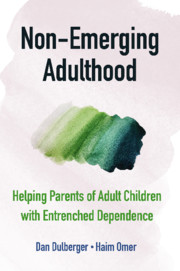Book contents
- Non-Emerging Adulthood
- Non-Emerging Adulthood
- Copyright page
- Contents
- Introduction
- 1 The Adult-Child
- 2 NVR and Accommodation
- 3 The Intervention
- 4 Suicide Threats
- 5 Helping Parents of Children and Adolescents at Risk of Failure to Emerge
- 6 Addressing Entrenched Dependence in Special Contexts
- 7 Survival Mode
- Conclusion
- Bibliography
- Index
2 - NVR and Accommodation
Published online by Cambridge University Press: 05 May 2021
- Non-Emerging Adulthood
- Non-Emerging Adulthood
- Copyright page
- Contents
- Introduction
- 1 The Adult-Child
- 2 NVR and Accommodation
- 3 The Intervention
- 4 Suicide Threats
- 5 Helping Parents of Children and Adolescents at Risk of Failure to Emerge
- 6 Addressing Entrenched Dependence in Special Contexts
- 7 Survival Mode
- Conclusion
- Bibliography
- Index
Summary
In Chapter 2, we argue why parental NVR is well-suited to treating entrenched dependence. We describe why attempts at individual therapy for the adult-child or traditional parental counseling usually fail. These failures have different forms, such as: (a) the adult-child refuses therapy; (b) the adult-child accepts therapy, but entitled dependence persists; (c) the parents are advised to show unconditional acceptance, but the dependence remains unaffected; or (d) the parents are advised to be tough, but are daunted when they stumble on frightening escalation. We argue that parents are almost invariably the motivated partners, that they deserve to be viewed as clients in their own right, and that involving the adult-child would distract the parents and the therapist from their job. We elaborate some central insights underlying parental NVR, such as: (a) that the parents' narrative of total responsibility actually prevents improvement; and (b) that parental accommodation aggravates and perpetuates the problem. The chapter concludes with a description of treatment goals and of what changes can be realistically expected.
Keywords
- Type
- Chapter
- Information
- Non-Emerging AdulthoodHelping Parents of Adult Children with Entrenched Dependence, pp. 34 - 46Publisher: Cambridge University PressPrint publication year: 2021



